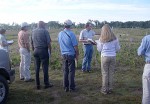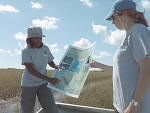It has been a very busy review year for LTER sites. In all, nine sites were reviewed by NSF review panels during 2009. Each LTER project is funded independently for six-year periods with site reviews held midway through the funding period. Review teams evaluate the quality of science, education and outreach as well as how well the site is managed and how integrated the sites are with the entire LTER network. This year, we paid special attention to the quality and quantity of data products, their accessibility and availability and their integration with the LTER network.
The NSF Biological Sciences Directorate Advisory Committee has commissioned a review team, co-chaired by Allison (Sonny) Powers and Anthony Michaels, to conduct a 30-year review of the whole LTER program. We have asked this committee to be very forward thinking in their review. This review is intended to be prospective, rather than retrospective, articulating a strategic vision that will strengthen the core science agenda for the LTER network over the coming decade. We have also asked them to consider the role LTER should play in data synthesis, management and analysis, particularly with respect to NSF investments such as NEON, CZO, and NCEAS, and how LTER should interface with these other investments. Issues might include long-lived data access and interoperability; the types of questions that NEON and other observatories will allow LTER to address, and LTER cyberinfrastructure considerations.
Finally, 12 LTER sites will be evaluated for renewal in April, 2010. All relevant Program Officers in NSF have been invited to participate in the running of the panels and to attend site reviews as observers, as well as to provide input to the construction of the review/award/decline letters. Currently eight jackets are managed outside the Division of Environmental Biology (DEB)--five in the Biological Oceanography Program, two in the Office of Polar Programs, and two are jointly managed by DEB and Social, Behavioral and Economic Sciences (SBE).
All in all, it has been a busy, but productive year for the LTER program officers, scientists and ecological community that we rely on so heavily for our peer review process.
Photos
LTER site review teams visited nine sites, including Harvard Forest, Cedar Creek, Sevilleta, and Florida Coastal Everglades. (Photos courtesy of NSF)

 Enlarge this image
Enlarge this image


